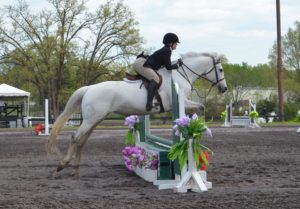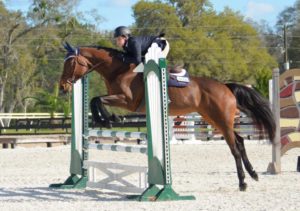“What you can’t accomplish in an hour should usually be put off until tomorrow.” ~Bill Steinkraus
I have a student who continually criticizes herself. During each lesson, she regularly laments how bad her leg feels, or how how she can’t seem to get it right, or how weak she is, often while in the middle of an exercise. Most times, this is the opposite of what I’m seeing, and I spend a lot of time trying to encourage her and build her up. To be honest, I don’t really feel heard. Her negative self-speak is much louder than my words of encouragement. Sadly, I think we both end up feeling frustrated.
Skill acquisition is tough. It’s hard work. It rarely feels good, at first. How can you expect your body to easily do something it has never done before? What if you are only working on it once or twice a week? I see it over and over again. Many battle their inner voice, struggling to accept the frustration that comes with learning new things.
Face it, when learning something new, we are all terrible. Until we aren’t.
The process of learning new skills in riding is the same for everyone. Here’s how it works:
1). Understand the theory and the mechanics of the new skill. Your trainer helps you do this by explaining the hows and whys of what you are trying to learn.
2). Attempt new skill. This is when riding may truly feel difficult!
3). Get feedback, both self-assessed and from trainer.
4). Repeat with small adjustments.
5). Repeat some more.
When you resist the fact that initial practice of a new skill is likely to be difficult, progress slows down. If you find yourself constantly lamenting the difficulties you are facing, that negative self-talk holds you back. It’s okay to express frustration, but if that’s most of what your discussions entail, whether with your trainer or your barn friends (or your online friends), you are hurting yourself. You’ve thrown up your own roadblock to success.
Watch out for trainers who aid that negative voice and reinforce it. That’s a certain way to hold yourself back. That doesn’t mean you need a trainer who is all fluff and never gives you constructive feedback. Every rider is on the their own path of progress. My job as trainer is to facilitate that progress. There is ALWAYS something good and redeeming about a performance, and there is ALWAYS something that can be improved.
Here are some tips to enjoy the journey to becoming a better rider:
Set Realistic Goals How much time do you spend in the saddle? Now how much of that time is spent actively working on things? Do you have the right horse for the job? In general, you are better off setting several smaller goals in order to reach a big goal, rather than just setting the big goal by itself. For instance, you may want to qualify for USEF Medal Finals, but first you’ll want to (a) make sure you are competent jumping 3’6” at home, (b) practice and gain experience in the type of testing that happens at the end of each qualifier class, which may be easier to achieve at the three foot height, (c) find small shows with less technical courses to start with, (d) work on getting more competitive in bigger, more technical classes, and so on. There’s a process, and you don’t want to skip steps just to get to the BIG GOAL, or you may end up overwhelming yourself or your horse, which may put you further away from your goal, rather than closer to it.
Make a Commitment
Talk to your trainer and make sure you are on the same page with regard to your goals. Most goals can be reached with the right amount of time spent practicing the right things. When you tell your trainer that you’ll be out two more times this week, make sure you come out. Time in the saddle is imperative – to gain strength, to develop feel and timing, to get comfortable jumping a new height. I find most people get frustrated when their goals (and the timeline) and their level of commitment don’t match.
Know When “Good Enough” IS Good Enough
When practicing, strive to remember that small steps are acceptable, even desirable. Quit while you’re ahead. Reward your horse for a job well done, and “finish on a good rep [repetition].” Try your hardest, keep working, and recognize when there’s at least a tiny bit of progress, then stop your work. Your mind will retain the good ride, instead of the faltering ride. When we neglect to do this, and ride past the point of fatigue – mental or physical, ours or our horse’s – that’s when we have failed. And it will be harder the next time. Know when to be satisfied. If you have set the bar too low, you’ll know it and can adjust your effort next time.

Understand How You Learn
If you need to learn things a different way, make sure your trainer knows that. Some riders can do something when it’s explained, others to need to see it demonstrated first, and still others need to have their foot or hand placed just so to feel what they are supposed to be doing. A good trainer will help you learn the way you learn best.
Reframe Your Thinking
Get rid of “can’t,” “don’t” and “no” from your vocabulary. Instead saying “I can’t get my leg in the right spot,” say “I am having trouble getting my leg in the right spot,” or “I need to work hard to think about keeping my leg close to the girth.” Think about what must be done to see improvement, instead of what you aren’t doing correctly. Your brain is a powerful tool for training your body to act instinctively and do the right things. If you think in terms of what you can’t do, that’s what your mind retains. Remember the old adage: Whether you think you can or think you can’t, you’re right!
Keep Communicating
Be prepared to let your trainer know what you are feeling and whether something is working or not. Your trainer can only see so much from the ground. If you are feeling anxious or your horse doesn’t feel quite like himself, speak up! It’s important to keep communicating. Your trainer is not a mind reader. Also remember, there’s a difference between frank discussion and complaining. Keep working.
Cut Yourself Some Slack
Sometimes you may not get something done in one ride, and you’ll need more time before it feels right. It’s easy to get frustrated with yourself (and your horse, and your trainer). But there’s a reason riding is a lifelong sport. It takes a while to get good, and even then, there’s always room for improvement. Keep working and forgive yourself when your body doesn’t match what your mind understands. Your body is forming new and more muscle memory, and that doesn’t happen overnight. Be prepared to put in the time and it will eventually come.
Try Something Different
Often we need to see things from a different perspective to make progress. Watch videos, read books, listen to podcasts. Study pictures of riders you want to emulate. Mimic the good riders you see at shows. Close your eyes and visualize your ride. Meditate. Find a clinic to attend. Maybe go out for a hack in a field. There are so many ways to get your brain in gear for learning and problem solving. If you feel like you aren’t able to get it right by doing the same thing over and over again, try doing something completely different.

Tap Into Your Happiness
Riding is supposed to be fun. If you’re not having fun when riding, why do it? But here’s the caveat: It may not always be fun. Trying something new, working on getting stronger, better, tougher – these things are hard work and they won’t always feel fun. But they make us better and there’s fun in that. They create a sense of accomplishment and growth in confidence. Those are things that help you in riding and in other areas of your life.
We should expect the process of learning to ride better to be hard. There will be mistakes. And some riders take longer than others to develop. That’s expected and it won’t matter to me or any other trainer worth their salt if it takes minutes, days, weeks or months. We want you to progress, but that progress will be stymied without your acceptance of some level of frustration and desire to “ride through the ugliness.” With the right attitude and commitment, it always gets better.
For more blogs about “riding through the ugliness,” read these:
Chronicle of the Horse Blogger, Lauren Spreiser: http://www.chronofhorse.com/article/embrace-suck

